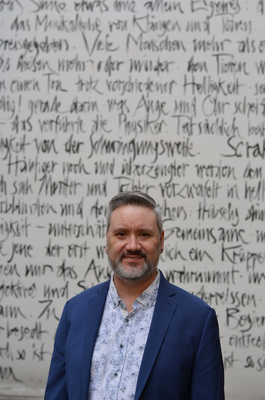Prof. Dr. Mark J. Butler

Lehrstuhlinhaber Popular Music Studies
Prof. Dr. Mark J. Butler
Professur für Popular Music Studies
Institut für Musikwissenschaft und Medienwissenschaft
Humboldt-Universität zu Berlin
10099 Berlin
Sitz: Am Kupfergraben 5, 10117 Berlin, Raum 312
Tel.: +49 30 2093 65806
Sprechstunde: derzeit krankheitsbedingt keine
E-Mail: mark.butler[at]hu-berlin.de
Mark J. Butler has held the professorship in Popular Music Studies since October 2021. He previously served as Professor and Associate Professor of Music Theory and Cognition at Northwestern University (2015–2021 and 2009–2015, respectively) and as an Assistant Professor of Music at the University of Pennsylvania (2003–2009). Butler received the PhD in Music Theory from Indiana University in 2003. He has held fellowships at the American Academy in Berlin and The University of Texas at Austin (Donald D. Harrington Faculty Fellow). He was President of the U.S. branch of the International Association for the Study of Popular Music from 2015–2017.
Butler’s research focuses on contemporary, groove-based popular music. He is an expert on electronic dance music. His first book, Unlocking the Groove (Indiana University Press, 2006), developed theoretical and analytical models for rhythm and meter in electronic dance music, a repertoire that had not been previously explored from a musicological point of view. He is also the editor of an anthology entitled Electronica, Dance, and Club Music (Ashgate, 2012), which was the first published reference book on the subject.
Butler’s second monograph is Playing with Something That Runs: Technology, Improvisation, and Composition in DJ and Laptop Performance (Oxford University Press, 2014). In this text he considers how musicians utilize pre-existent, seemingly “fixed” elements such as records and digital samples to create dynamic, real-time improvisations, as well as the ways in which technologies, both material and musical, make these transformations possible. Based on extensive field research with leading electronic musicians in Berlin, Playing with Something That Runs analyzes real-time musical performances in relation to the recorded elements that comprise them. The book received the Outstanding Publication Award from the Popular Music Interest Group of the Society for Music Theory in 2015.
Butler has also published articles and chapters on subjects such as mobility in Berlin-based laptop performance, alternative constructions of authenticity in the music of the Pet Shop Boys, and the interaction of voice and genre in relation to gender and sexuality in the songs of indie-pop composer Stephin Merritt. He is currently preparing a second edition of Unlocking the Groove, now under contract with Oxford University Press.
Selected PUBLICATIONS
Books Authored
Playing with Something That Runs: Technology, Improvisation, and Composition in DJ and Laptop Performance. New York: Oxford University Press, 2014.
Unlocking the Groove: Rhythm, Meter, and Musical Design in Electronic Dance Music. Bloomington, Ind.: Indiana University Press, 2006. [New edition under contract with Oxford University Press.]
Books Edited
Electronica, Dance and Club Music. The Library of Essays on Popular Music. Farnham, Surrey, UK: Ashgate, 2012.
Peer-Reviewed Articles and Chapters
“Listener Orientation.” In Sound as Popular Culture: A Research Companion, eds. Jens Gerritt Papenburg and Holger Schulze, 367–72. Cambridge, Mass.: MIT Press, 2016.
“(In)Visible Mediators: Interface Design and the Disappearing Computer in Berlin-Based Laptop Performances.” In The Oxford Handbook of Mobile Music Studies, ed. Sumanth Gopinath and Jason Stanyek, 259–91. New York: Oxford University Press, 2014.
“‘Some of Us Can Only Live in Songs of Love and Trouble’: Voice, Genre/Gender, and Sexuality in the Music of Stephin Merritt.” In Oh Boy! Masculinities in Popular Music, ed. Freya Jarman-Ivens, 235–60. New York: Routledge, 2007.
“Hearing Kaleidoscopes: Embedded Grouping Dissonance in Electronic Dance Music.” twentieth-century music 2, no. 2 (2005): 221–43.
“‘Everybody Needs a 303, Everybody Loves a Filter’: Electronic Dance Music and the Aesthetics of Obsolescence.” In Digital Media: Transformations in Human Communication, ed. Paul Messaris and Lee Humphreys, 111–18. New York: Peter Lang, 2005.
“Taking It Seriously: Intertextuality and Authenticity in Two Covers by the Pet Shop Boys.” Popular Music 22, no. 1 (2003): 1–19.
“De Grammatica et Musica: Grammatical Analogies in Medieval Music Treatises and Their Applications in Gregorian Chant.” Theoria 9 (2001): 1–24.
“Turning the Beat Around: Reinterpretation, Metrical Dissonance, and Asymmetry in Electronic Dance Music.” Music Theory Online 7.6 (2001). Available from https://www.mtosmt.org/issues/mto.01.7.6/mto.01.7.6.butler.html (accessed 14 August 2023).
Translated Publications
“‘Comme Si Tu Te Remixais Toi-Même’: Ontologies de l’oeuvre Provisoire Dans Les Musiques Électroniques.” In Penser Les Musiques Populaires, edited by Gérôme Guibert and Guillaume Heuguet, translated by Emmanuel Parent. La Rue Musicale. Paris: Philharmonie de Paris, 2022.
“Design d’interface, Interaction et Indétermination Technologique Dans Les Performances de l’EDM.” In La Musique et La Machine: Penser l’interaction Dans Les Musiques Électroniques, edited by Emmanuel Parent, Kévin Gohon, and Pierre Couprie, translated by Baptiste Bacot, 25–49. Rennes: Presses universitaires de Rennes, 2022.
“Kommunikative Strategien und Ideologien von Liveness bei Laptop-Performances.” In Techno Studies: Äesthetik und Geschichtsschreibung Elektronischer Tanzmusik, eds. Kim Feser and Matthias Pasdzierny. Translation by Mathis Krause, 211–20. Berlin: B_books, 2017.
(current) Courses:
WiSe 2023-2024
VL Electronic Dance Music: Themes, Theories, and Scenes
SE Interfaces, Instruments, and Embodied Cognition in Popular Music Practice
SE Introduction to Popular Music Analysis
Colloquium in Popular Music Studies
Courses taught in past semesters:
SoSe 2022
VL Musical Repetition
SE Interfaces, Instruments, and Technology in Performance, Production, and Play
SE Current Readings in Popular Music Studies
Colloquium in Popular Music Studies
WiSe 2021-22
VL Electronic Dance Music: Themes, Theories and Scenes
SE Music and the Body
SE Analysis of Popular Music
Colloquium in Popular Music Studies
